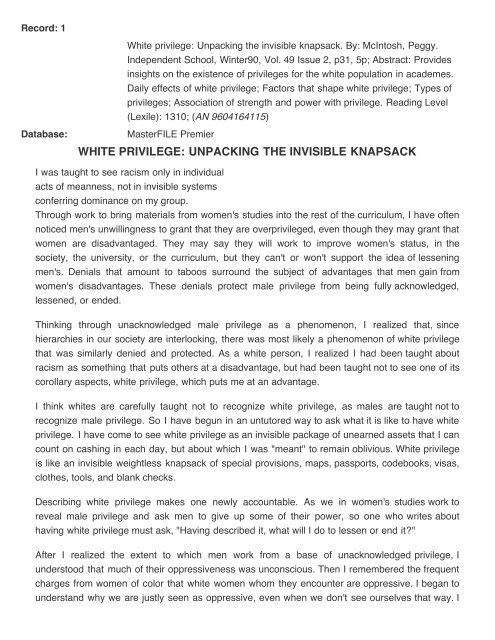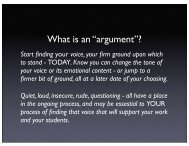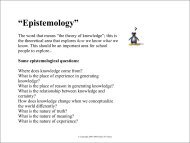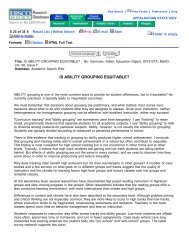WHITE PRIVILEGE: UNPACKING THE INVISIBLE KNAPSACK
WHITE PRIVILEGE: UNPACKING THE INVISIBLE KNAPSACK
WHITE PRIVILEGE: UNPACKING THE INVISIBLE KNAPSACK
Create successful ePaper yourself
Turn your PDF publications into a flip-book with our unique Google optimized e-Paper software.
Record: 1<br />
White privilege: Unpacking the invisible knapsack. By: McIntosh, Peggy.<br />
Independent School, Winter90, Vol. 49 Issue 2, p31, 5p; Abstract: Provides<br />
insights on the existence of privileges for the white population in academes.<br />
Daily effects of white privilege; Factors that shape white privilege; Types of<br />
privileges; Association of strength and power with privilege. Reading Level<br />
(Lexile): 1310; (AN 9604164115)<br />
Database:<br />
MasterFILE Premier<br />
<strong>WHITE</strong> <strong>PRIVILEGE</strong>: <strong>UNPACKING</strong> <strong>THE</strong> <strong>INVISIBLE</strong> <strong>KNAPSACK</strong><br />
I was taught to see racism only in individual<br />
acts of meanness, not in invisible systems<br />
conferring dominance on my group.<br />
Through work to bring materials from women's studies into the rest of the curriculum, I have often<br />
noticed men's unwillingness to grant that they are overprivileged, even though they may grant that<br />
women are disadvantaged. They may say they will work to improve women's status, in the<br />
society, the university, or the curriculum, but they can't or won't support the idea of lessening<br />
men's. Denials that amount to taboos surround the subject of advantages that men gain from<br />
women's disadvantages. These denials protect male privilege from being fully acknowledged,<br />
lessened, or ended.<br />
Thinking through unacknowledged male privilege as a phenomenon, I realized that, since<br />
hierarchies in our society are interlocking, there was most likely a phenomenon of white privilege<br />
that was similarly denied and protected. As a white person, I realized I had been taught about<br />
racism as something that puts others at a disadvantage, but had been taught not to see one of its<br />
corollary aspects, white privilege, which puts me at an advantage.<br />
I think whites are carefully taught not to recognize white privilege, as males are taught not to<br />
recognize male privilege. So I have begun in an untutored way to ask what it is like to have white<br />
privilege. I have come to see white privilege as an invisible package of unearned assets that I can<br />
count on cashing in each day, but about which I was "meant" to remain oblivious. White privilege<br />
is like an invisible weightless knapsack of special provisions, maps, passports, codebooks, visas,<br />
clothes, tools, and blank checks.<br />
Describing white privilege makes one newly accountable. As we in women's studies work to<br />
reveal male privilege and ask men to give up some of their power, so one who writes about<br />
having white privilege must ask, "Having described it, what will I do to lessen or end it?"<br />
After I realized the extent to which men work from a base of unacknowledged privilege, I<br />
understood that much of their oppressiveness was unconscious. Then I remembered the frequent<br />
charges from women of color that white women whom they encounter are oppressive. I began to<br />
understand why we are justly seen as oppressive, even when we don't see ourselves that way. I
egan to count the ways in which I enjoy unearned skin privilege and have been conditioned into<br />
oblivion about its existence.<br />
My schooling gave me no training in seeing myself as an oppressor, as an unfairly advantaged<br />
person, or as a participant in a damaged culture. I was taught to see myself as an individual<br />
whose moral state depended on her individual moral will. My schooling followed the pattern my<br />
colleague Elizabeth Minnich has pointed out: whites are taught to think of their lives as morally<br />
neutral, normative, and average, and also ideal, so that when we work to benefit others, this is<br />
seen as work that will allow "them" to be more like "us."<br />
Daily effects of white privilege<br />
I decided to try to work on myself at least by identifying some of the daily effects of white privilege<br />
in my life. I have chosen those conditions that I think in my case attach somewhat more to skincolor<br />
privilege than to class, religion, ethnic status, or geographic location, though of course all<br />
these other factors are intricately intertwined. As far as I can tell, my African American coworkers,<br />
friends, and acquaintances with whom I come into daily or frequent contact in this particular time,<br />
place, and line of work cannot count on most of these conditions.<br />
I can, if I wish, arrange to be in the company of people of my race most of the time.<br />
If I should need to move, I can be pretty sure of renting or purchasing housing in an area that I<br />
can afford and in which I would want to live.<br />
I can be pretty sure that my neighbors in such a location will be neutral or pleasant to me.<br />
I can go shopping alone most of the time, pretty well assured that I will not be followed or<br />
harassed.<br />
I can turn on the television or open to the front page of the paper and see people of my race<br />
widely represented.<br />
When I am told about our national heritage or about "civilization," I am shown that people of my<br />
color made it what it is.<br />
I can be sure that my children will be given curricular materials that testify to the existence of their<br />
race.<br />
If I want to, I can be pretty sure of finding a publisher for this piece on white privilege.<br />
I can go into a music shop and count on finding the music of my race represented, into a<br />
supermarket and find the staple foods that fit with my cultural traditions, into a hairdresser's shop<br />
and find someone who can deal with my hair.<br />
Whether I use checks, credit cards, or cash, I can count on my skin color not to work against the<br />
appearance of financial reliability.<br />
I can arrange to protect my children most of the time from people who might not like them.<br />
I can swear, or dress in second-hand clothes, or not answer letters without having people<br />
attribute these choices to the bad morals, the poverty, or the illiteracy of my race.<br />
I can speak in public to a powerful male group without putting my race on trial.<br />
I can do well in a challenging situation without being called a credit to my race.<br />
I am never asked to speak for all the people of my racial group.
I can remain oblivious of the language and customs of persons of color, who constitute the world's<br />
majority, without feeling in my culture any penalty for such oblivion.<br />
I can criticize our government and talk about how much I fear its policies and behavior without<br />
being seen as a cultural outsider. 18. I can be pretty sure that if I ask to talk to "the person in<br />
charge" I will be facing a person of my race.<br />
If a traffic cop pulls me over, or if the IRS audits my tax return, I can be sure I haven't been<br />
singled out because of my race.<br />
I can easily buy posters, postcards, picture books, greeting cards, dolls, toys, and children's<br />
magazines featuring people of my race.<br />
I can go home from most meetings of organizations I belong to feeling somewhat tied in rather<br />
than isolated, out of place, outnumbered, unheard, held at a distance, or feared.<br />
I can take a job with an affirmative action employer without having coworkers on the job suspect<br />
that I got it because of race.<br />
I can choose public accommodation without fearing that people of my race cannot get in or will be<br />
mistreated in the places I have chosen.<br />
I can be sure that if I need legal or medical help my race will not work against me.<br />
If my day, week, or year is going badly, I need not ask of each negative episode or situation<br />
whether it has racial overtones.<br />
I can choose blemish cover or bandages in "flesh" color that more or less match my skin.<br />
Elusive and fugitive<br />
I repeatedly forgot each of the realizations on this list until I wrote it down. For me white privilege<br />
has turned out to be an elusive and fugitive subject. The pressure to avoid it is great, for in facing<br />
it I must give up the myth of meritocracy. If these things are true, this is not such a free country;<br />
one's life is not what one makes it; many doors open for certain people through no virtues of their<br />
own.<br />
In unpacking this invisible knapsack of white privilege, I have listed conditions of daily experience<br />
that I once took for granted. Nor did I think of any of these perquisites as bad for the holder. I now<br />
think that we need a more finely differentiated taxonomy of privilege, for some of these varieties<br />
are only what one would want for everyone in a just society, and others give license to be<br />
ignorant, oblivious, arrogant, and destructive.<br />
I see a pattern running through the matrix of white privilege, a pattern of assumptions that were<br />
passed on to me as a white person. There was one main piece of cultural turf; it was my own turf,<br />
and I was among those who could control the turf. My skin color was an asset for any more I was<br />
educated to want to make. I could think of myself as belonging in major ways and of making<br />
social systems work for me. I could freely disparage, fear, neglect, or be oblivious to anything<br />
outside of the dominant cultural forms. Being of the main culture, I could also criticize it fairly<br />
freely.<br />
In proportion as my racial group was being made confident, comfortable, and oblivious, other<br />
groups were likely being made unconfident, uncomfortable, and alienated. Whiteness protected
me from many kinds of hostility, distress, and violence, which I was being subtly trained to visit, in<br />
turn, upon people of color.<br />
For this reason, the word "privilege" now seems to me misleading. We usually think of privilege as<br />
being a favored state, whether earned or conferred by birth or luck. Yet some of the conditions I<br />
have described here work systematically to overempower certain groups. Such privilege simply<br />
confers dominance because of one's race or sex.<br />
Earned strength, unearned power<br />
I want, then, to distinguish between earned strength and unearned power conferred systemically.<br />
Power from unearned privilege can look like strength when it is in fact permission to escape or to<br />
dominate. But not all of the privileges on my list are inevitably damaging. Some, like the<br />
expectation that neighbors will be decent to you, or that your race will not count against you in<br />
court, should be the norm in a just society. others, like the privilege to ignore less powerful people,<br />
distort the humanity of the holders as well as the ignored groups.<br />
We might at least start by distinguishing between positive advantages, which we can work to<br />
spread, and negative types of advantage, which unless rejected will always reinforce our present<br />
hierarchies. For example, the feeling that one belongs within the human circle, as Native<br />
Americans say, should not be seen as privilege for a few. Ideally it is an unearned entitlement. At<br />
present, since only a few have it, it is an unearned advantage for them. This paper results from a<br />
process of coming to see that some of the power that I originally saw as attendant on being a<br />
human being in the United States consisted in unearned advantage and conferred dominance.<br />
I have met very few men who are truly distressed about systemic, unearned male advantage and<br />
conferred dominance. And so one question for me and others like me is whether we will be like<br />
them, or whether we will get truly distressed, even outraged, about unearned race advantage and<br />
conferred dominance, and, if so, what we will do to lessen them. In any case, we need to do more<br />
work in identifying how they actually affect our daily lives. Many, perhaps most, of our white<br />
students in the United States think that racism doesn't affect them because they are not people of<br />
color; they do not see "whiteness" as a racial identity. In addition, since race and sex are not the<br />
only advantaging systems at work, we need similarly to examine the daily experience of having<br />
age advantage, or ethnic advantage, or physical ability, or advantage related to nationality,<br />
religion, or sexual orientation.<br />
Difficulties and dangers surrounding the task of finding parallels are many. Since racism, sexism,<br />
and heterosexism are not the same, the advantages associated with them should not be seen as<br />
the same. In addition, it is hard to disentangle aspects of unearned advantage that rest more on<br />
social class, economic class, race, religion, sex, and ethnic identity than on other factors. Still, all<br />
of the oppressions are interlocking, as the members of the Combahee River Collective pointed out<br />
in their "Black Feminist Statement" of 1977.<br />
One factor seems clear about all of the interlocking oppressions. They take both active forms,
which we can see, and embedded forms, which as a member of the dominant group one is taught<br />
not to see. In my class and place, I did not see myself as a racist because I was taught to<br />
recognize racism only in individual acts of meanness by members of my group, never in invisible<br />
systems conferring unsought racial dominance on my group from birth.<br />
Disapproving of the systems won't be enough to change them. I was taught to think that racism<br />
could end if white individuals changed their attitudes. But a "white" skin in the United States opens<br />
many doors for whites whether or not we approve of the way dominance has been conferred on<br />
us. Individual acts can palliate, but cannot end, these problems.<br />
To redesign social systems we need first to acknowledge their colossal unseen dimensions. The<br />
silences and denials surrounding privilege are the key political tool here. They keep the thinking<br />
about equality or equity incomplete, protecting unearned advantage and conferred dominance by<br />
making these subjects taboo. Most talk by whites about equal opportunity seems to me now to be<br />
about equal opportunity to try to get into a position of dominance while denying that systems of<br />
dominance exist.<br />
It seems to me that obliviousness about white advantage, like obliviousness about male<br />
advantage, is kept strongly inculturated in the United States so as to maintain the myth of<br />
meritocracy, the myth that democratic choice is equally available to all. Keeping most people<br />
unaware that freedom of confident action is there for just a small number of people props up<br />
those in power and serves to keep power in the hands of the same groups that have most of it<br />
already.<br />
Although systemic change takes many decades, there are pressing questions for me and, I<br />
imagine, for some others like me if we raise our daily consciousness on the perquisites of being<br />
light-skinned. What will we do with such knowledge? As we know from watching men, it is an<br />
open question whether we will choose to use unearned advantage to weaken hidden systems of<br />
advantage, and whether we will use any of our arbitrarily awarded power to try to reconstruct<br />
power systems on a broader base.<br />
Permission to reprint this excerpt must be obtained from Peggy McIntosh at the address above or<br />
by calling her at 617-431-1453.<br />
This excerpted essay is reprinted here from the July/August 1989 issue of Peace and Freedom,<br />
the bimonthly journal of the Women's International League for Peace and Freedom, based at<br />
1213 Race St., Philadelphia PA 19107.<br />
~~~~~~~~<br />
By Peggy McIntosh<br />
Peggy McIntosh is associate director of the Wellesley College Center for Research on Women.<br />
This essay is exerpted from Working Paper 189, "White Privilege and Male Privilege: A Personal<br />
Account of Coming To See Correspondences through Work in Women's Studies" (1988), by
Peggy McIntosh; available for $4.00 from the Wellesley College Center for Research on Women,<br />
Wellesley MA 02181. The working paper contains a longer list of privileges.<br />
Copyright of Independent School is the property of National Association of Independent Schools<br />
and its content may not be copied or emailed to multiple sites or posted to a listserv without the<br />
copyright holder's express written permission. However, users may print, download, or email<br />
articles for individual use.





